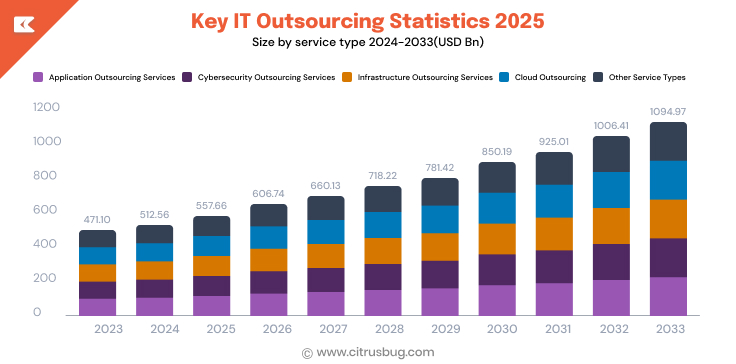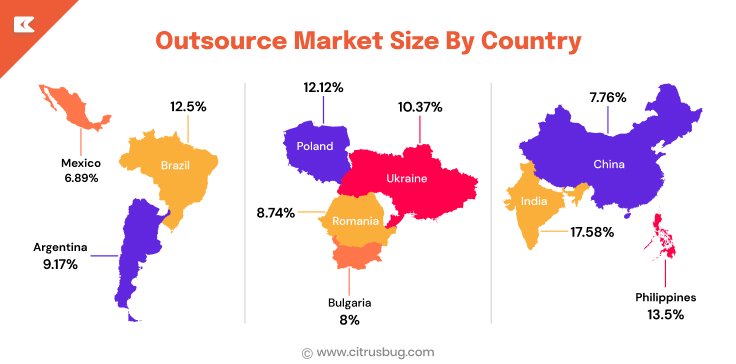IT Outsourcing Statistics in 2025: Top Countries & Their Market Share
- May 27, 2025
-
3292 Views
- by Ishan Vyas

The world of IT outsourcing has been transforming industries for decades, and as we move into 2025, this trend shows no signs of slowing down. Businesses all over the world rely on outsourcing for its many advantages, from cost optimization to expert skilled expertise.
This time around, we’re analyzing the latest IT outsourcing statistics, concentrating on the most significant ones that indicate the industry’s current and future direction. Also, we’ll look at regions and practices like outsourcing software development, and the crucial advantages of these approaches.
Whether you aim to understand how IT outsourcing operates in different industries or seek insight on strategically using these services to grow your business, this blog will cater to all your needs.
What is IT Outsourcing?
IT outsourcing refers to assigning the ‘IT’ portion of the business process to 3rd party service providers. This gives businesses the advantage to specialize in their primary roles of the company, minimizes the expenses of the company, and gives access to other external skills. This approach also applies in other activities such as software development, infrastructure management, and help desk support activities.
IT outsourcing has gained the attention of businesses all over the world with its benefits in scalability and cost savings.
Now, let’s look at the numbers that tell the story of IT outsourcing in 2025.
Key IT Outsourcing Statistics in 2025
The Global IT Outsourcing market is booming
The Global IT Outsourcing Market is estimated to grow from USD 471.1 Billion in 2023 to about USD 1,094.9 Billion by 2033, marking a CAGR of 8.80% growth from 2024 to 2033.
A large part of this growth is caused by businesses looking for additional savings, especially during economically challenging times. This shows an increasing tendency of reliance on outsourcing to optimize IT functions and speed up transformations in business operations to achieve digital objectives.
70% of companies outsource for cost savings
70% of companies confirm that outsourcing is more economical especially when compared to the costs associated with in-house staffing and management.
This is reasonable when you think of the striking return on investment, especially for growing small and medium-sized companies that need to scale up without silly extra operational costs.
Outsourcing, such as with software development, helps increase budgetary efficiency and enables businesses to allocate that savings toward innovation and new products, thus enhancing growth.
83% of IT leaders are re-evaluating outsourcing strategies post-COVID
The pandemic brought to reconsider the relevance of flexibility and agility in the day to day functions of a business. Gartner mentions that 83% of worldwide IT leaders intend to reassess their existing IT outsourcing options to improve coping strategies and enhance resilience.
This shift underscores the need for scalable and efficient outsourcing solutions that can adapt quickly to changing business needs, ensuring sustainable growth.
India remains the top outsourcing destination
India continues to dominate the outsourcing market for IT services due to the vast pool of skilled specialists and cost effective service options. The country has over 5 million software developers, which enables US and Europe companies to access Indian talent for high-quality tech services.
In addition to being cost-effective, outsourcing in India provides companies access to specialized experts in project management and software development. Indian IT companies are also known to excel in newly emerging fields which include artificial intelligence, blockchain technology, and custom software development.
A Majority of G2000 Companies Use IT Outsourcing
According to a 2024 report by Exploding Topics, 92% of Global 2000 (G2000) companies utilize IT outsourcing services. This goes to show the importance of outsourcing to these companies as they seek to streamline operations, sharpen their competitive advantage, improve synergies and leverage more on specialized exceptional services.
More noteworthy, a Digital Minds BPO report states IT services capture roughly 72% share of the value of outsourcing contracts across the globe. We cannot overemphasize the degree to which IT functions dominate the outsourcing market.
The hybrid outsourcing models (onshore, nearshore, and offshore) IT service providers have embraced offer these corporations customization options that fit their set budgets .
The rise of custom software development solutions
In order to fulfill some of their organizational requirements, businesses are now shifting towards custom software development services for which they have unique specifications. As per The Business Research Company report, the custom software development market is expected to expand from 44.52 billion in 2024 to 54.26 billion in 2025, showing a compound annual growth rate (CAGR) of 21.9%. This enables companies to develop systems to fit their specific business processes which translates to a competitive edge in the market.
Outsourcing further enables businesses to accomplish specific control, management, functionality, and growth benchmarks in their systems which include industry-specific bespoke CRMs or AI analytics systems.
Cybersecurity concerns heighten emphasis on vendor selection
IT outsourcing comes with a share of advantages and benefits, but it has increased focus on vendor selection due to cybersecurity concerns. In fact, studies reveal that 60% of businesses will prioritize cybersafety capabilities by 2025 while picking an outsourcing vendor.
Working with an outsourcing partner that offers managed services helps lower operational expenditure alongside improving a business’s efficiency. However, as this statistic reveals, choosing an appropriate partner who employs strong data security processes is crucial in shielding sensitive business data.
Statistics of Countries That Dominate the IT Outsourcing Sector
The global software outsourcing market in 2025 is witnessing major shifts, with Eastern Europe gaining significant momentum, while traditional giants like India and China continue to lead in size and scale. Here’s a breakdown of the most influential countries shaping the software outsourcing landscape in 2025:
India
As of 2025, India’s share in the world’s software outsourcing business is expected to be $10.51 Billion USD, which is about 17.58% of the global market making India the prominent leader in this sector. India also boasts a phenomenal CAGR of 17.58%.
The abundance of IT talent in India’s Bangalore, Hyderabad, and Pune make India a one-stop hub for all IT services because of the presence of several global IT companies. The country has a vast pool of labor at reasonable prices, English proficiency, and low costs of Infrastructure, which are the chief components supporting IT outsourcing, also aiding India’s growth derive from cost served obstained IT resources like AI, analytics, and cloud transformation.
Philippines
The Philippines account for 13.5% of the global software outsourcing market. This comes with an industry value of $686 million USD and a CAGR of 13.5%. Growth is fueled by improved English and Spanish language skills, lower costs, highly priced educational programs developed for IT global standards, and strong educational programs.
The Philippines has recently become the most preferred region for US, UK, and Australian businesses due to the time zone and culture. Customer support, backend development, and IT maintenance services specialization are on the rise in the country.
Brazil
In 2024, Brazil had reachede an approximate value of $6.13 billion USD in its software outsourcing industry which currently captures 12.5% of the global market. The notable CAGR of 12.5% indicates an upward momentum for the country.
Due to the Spanish, Portuguese, and English fluency, alongside the proximity to both the US and Europe time zones, Brazil has a diversified outsourcing service model. This makes the country a host to over 750,000 IT professionals which is the highest in Latin America.
Poland
Poland possesses a share of the market equal to 12.12% alongside holding an estimated software outsourcing market of more than 3 billion USD in 2024. It’s one of the fastest growing IT outsoucing economies in Europe with a CAGR of 12.12%.
Poland is located within the EU and has an educated workforce which is able to work in technical and STEM fields. Poland has more than 400,000 experts in the IT sector. This also means that Poland’s location greatly benefits Europe, giving value, quality, and meeting compliant EU regulations.
Ukraine
Despite geopolitical challenges, as of 2024, Ukraine’s share of the global outsourcing market is estimated to be $3.7 billion, showcasing its potential with a remarkable CAGR of 10.37%.
The effort that 96% of clients deciding to remain with Ukrainian providers during the war situations is admirable, as is the industry-wide ability to keep functioning during turbulences. The country continues to attract attention for its engineering skills, particularly for servicing the fintech, AI, and cybersecurity industries.
Romania
In Romania, the software outsourcing market accounts for 8.74% of the global outsourcing market, which means that the industry is worth approximately $415.2 million USD. Romania’s projected growth rate (CAGR) of 8.74% indicates that it is on a path of steady growth.
Romania’s IT market employs 200,000 people across more than 440 tech companies. In addition, the country is granting tax incentives to software developers, while simultaneously enhancing digital infrastructure, which makes Romania an attractive candidate for nearshore outsourcing in Europe.
Bulgaria
Bulgaria has 8% share of the outsourcing market which is quite remarkable given the country’s population of just over 6.5 million. As of 2024, this market was valued at $144.7 million, and is expected to reach nearly $500 million by 2028, bolststered by steady growth and a CAGR of around 8%.
Bulgaria’s capital city Sofia is an emerging IT center that is steering the country towards having good digital infrastructure and a lot of tech specialists. As well, Bulgaria’s geographical location is very convenient for advanced European economies looking for affordable, high-quality offshore services.
China
As of 2024, China leads with an astonishing total market size of $28.76 billion USD, but its growth is more tempered with a relatively lower CAGR of 7.76%. China is moving from economical IT service provisions to more advanced, sophisticated, and high-margin products due to increasing labor costs and changes in the economy.
Yet, the country’s enormous software technologies infrastructure and extensive engineering talent guarantees that China will still retain a position in the field of outsourcing software development, particularly in complex business systems and embedded solutions for computer hardware and software systems.
Mexico
Mexico’s outsourcing market size reached approximately $5.06 billion USD in 2024, with a global share just behind Brazil, and a moderate CAGR of 6.89%.
Mexico’s success is largely driven by its geographic proximity to the US and Canada, allowing for real-time collaboration and lower latency. It serves both North American and Latin American markets and provides a mix of low-cost and premium IT services.
Argentina
The IT outsourcing market in Argentina is relatively small compared to their counterparts in the region, but is strategically significant for Latin America. It was valued at $417.2 million USD in 2024 with a CAGR of 9.17%.
Argentina has the highest English proficiency in Latin America and an abundant supply of STEM graduates. However, the country’s macroeconomic volatility and changing currency limits growth potential. With more stability, Argentina could claim a larger role on the global stage.
[Source: Dreamix]
AI-Driven IT Outsourcing Stats
The integration of Artificial Intelligence (AI) into IT outsourcing service processes has automated service delivery and resource optimization at organizational levels. AI-based solutions enable more accurate, predictive, and economical offerings. As noted in a Gartner report, 70% of firms are set to incorporate AI technologies into their outsourcing frameworks by 2025, pointing towards an increased dependence on automated intelligent systems.
Outsourcing aids in accessing sophisticated innovation tools and technologies by engaging contractors specializing in AI software development. In addition, a study noted that 65% of organizations that outsourced AI tasks recorded lowered project costs and faster project completion, signaling a growing trend towards more intelligent and versatile outsourcing models.
India has taken the lead as a preferred destination for AI outsourcing, and some of the top AI development companies in India are dealing with advanced automation, workflow, and data analytics solutions. Such partnerships enable firms to leverage productivity gains along with actionable business intelligence to remain competitive within their respective industries. An assessment of an emerging competitor’s AI capabilities is just as important as evaluating their cybersecurity measures, ensuring organizations achieve both scalability and security in their IT strategies.
Advantages of IT Outsourcing
Cost-Effective Solutions
Outsourcing has been linked to having the remarkable ability to save costs, and for a good reason. From software development to infrastructure management, companies are able to rise above the costly overhead burdens of maintaining in-house teams while simultaneously harnessing international talent.
Access to Expertise and Innovation
App development, AI integration, and data analytics are just some of the various skill sets that are best reserved for specialists. For companies that lack top-tier in-house talent, having the right provider proves to be immensely helpful, especially when it comes to gaining access to life-changing solutions that help drive innovation while staying ahead of competition.
Scalability and Flexibility
Having shifts in business operations according to demand becomes much easier when outsourcing. During periods of rapid growth or economic uncertainty, it becomes easier to adapt and make changes without the hassle that comes with full-time employees or long-term commitments.
Focus on Core Activities
By offloading complex or time-consuming IT functions, businesses can refocus on their primary objectives, such as strategy, growth, and customer engagement.
Faster Time to Market
Specialist providers can undertake per-project based contracts, enabling businesses to take a flexible approach to timelines. Accelerated timelines, speedy deployments, and enhanced competitive edge are some irrefutable outcomes.
How to Leverage IT Outsourcing for Strategic Success
If you want to achieve the maximum possible benefits from the available IT outsourcing numbers, then consider the following suggestions:
- Identify Your Needs: Identify which IT functions or projects can be outsourced externally while still retaining the necessary quality and control.
- Choose the Right Model: Determine if a business’s goals would be better served by onshore, nearshore, or offshore outsourcing.
- Research Providers Thoroughly: Find proper IT outsourcers who have solid industry reputation, put emphasis on security, and are reputed within your industry.
- Foster Communication: Set up continuous and effective communication with the outsourcing partner so that a common understanding of the goals and targets can be achieved.
- Measure Success: Return on investment from outsourced projects can be calculated via the KPIs related to cost, project delivery, and overall efficiency of the results.
What Does the Future Hold for IT Outsourcing?
Technological evolution such as integration of artificial intelligence, automation, and cloud computing will undoubtedly transform the future of IT outsourcing. AI-fueled processes such as intelligent automation and predictive analytics will enable service providers to enhance their operational efficiency and better anticipate their client’s needs.
Furthermore, with the adoption of remote working, companies will increasingly make use of outsourced services to access global talent and stay competitive in a globalized market.
AI will further drive assists to enable businesses to manage functionalities in real time increasing ease on their day to day assignments. Outsourcing AI Development Services helps companies implement such solutions efficiently and at scale.For companies looking to minimize expenses while maintaining operational flexibility, outsourcing will continue to be a vital avenue for business growth.





 SaaS Development
SaaS Development Web Application Development
Web Application Development Mobile Application Development
Mobile Application Development Custom Software Development
Custom Software Development Cloud Development
Cloud Development DevOps Development
DevOps Development MVP Development
MVP Development Digital Product Development
Digital Product Development Hire Chatbot Developers
Hire Chatbot Developers Hire Python Developers
Hire Python Developers Hire Django Developers
Hire Django Developers Hire ReactJS Developers
Hire ReactJS Developers Hire AngularJS Developers
Hire AngularJS Developers Hire VueJS Developers
Hire VueJS Developers Hire Full Stack Developers
Hire Full Stack Developers Hire Back End Developers
Hire Back End Developers Hire Front End Developers
Hire Front End Developers AI Healthcare Software Development & Consulting
AI Healthcare Software Development & Consulting Healthcare App Development
Healthcare App Development EHR Software Development
EHR Software Development Healthcare AI Chatbot Development
Healthcare AI Chatbot Development Telemedicine App Development Company
Telemedicine App Development Company Medical Billing Software Development
Medical Billing Software Development Fitness App Development
Fitness App Development RPM Software Development
RPM Software Development Medicine Delivery App Development
Medicine Delivery App Development Medical Device Software Development
Medical Device Software Development Patient Engagement Software Solutions
Patient Engagement Software Solutions Mental Health App Development
Mental Health App Development Healthcare IT Consulting
Healthcare IT Consulting Healthcare CRM Software Development
Healthcare CRM Software Development Healthcare IT Managed Services
Healthcare IT Managed Services Healthcare Software Testing services
Healthcare Software Testing services Medical Practice Management Software
Medical Practice Management Software Outsourcing Healthcare IT Services
Outsourcing Healthcare IT Services IoT Solutions for Healthcare
IoT Solutions for Healthcare Medical Image Analysis Software Development Services
Medical Image Analysis Software Development Services Lending Software Development Services
Lending Software Development Services Payment Gateway Software Development
Payment Gateway Software Development Accounting Software Development
Accounting Software Development AI-Driven Banking App Development
AI-Driven Banking App Development Insurance Software Development
Insurance Software Development Finance Software Development
Finance Software Development Loan Management Software Development
Loan Management Software Development Decentralized Finance Development Services
Decentralized Finance Development Services eWallet App Development
eWallet App Development Payment App Development
Payment App Development Money Transfer App Development
Money Transfer App Development Mortgage Software Development
Mortgage Software Development Insurance Fraud Detection Software Development
Insurance Fraud Detection Software Development Wealth Management Software Development
Wealth Management Software Development Cryptocurrency Exchange Platform Development
Cryptocurrency Exchange Platform Development Neobank App Development
Neobank App Development Stock Trading App Development
Stock Trading App Development AML software Development
AML software Development Web3 Wallet Development
Web3 Wallet Development Robo-Advisor App Development
Robo-Advisor App Development Supply Chain Management Software Development
Supply Chain Management Software Development Fleet Management Software Development
Fleet Management Software Development Warehouse Management Software Development
Warehouse Management Software Development LMS Development
LMS Development Education App Development
Education App Development Inventory Management Software Development
Inventory Management Software Development Property Management Software Development
Property Management Software Development Real Estate CRM Software Development
Real Estate CRM Software Development Real Estate Document Management Software
Real Estate Document Management Software Construction App Development
Construction App Development Construction ERP Software Development
Construction ERP Software Development










